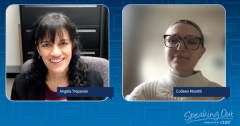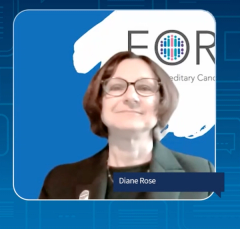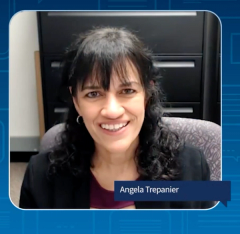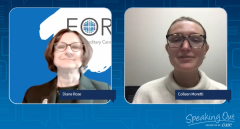
Clinical Trials in Hereditary Cancer Maybe A Key to Better Health Outcomes
As a part of its “Speaking Out” video series, on behalf of FORCE, CURE® spoke with Diane Rose, their vice president of volunteer programs, about clinical trials for patients with hereditary cancers and those who have a risk of developing.
Episodes in this series
Transcription:
Colleen Moretti: Are there clinical trials available for those who have a hereditary cancer or increased risk of one due to a mutation or passed down gene?
Diane Rose: Yes, there are many trials that are open in enrolling people affected by hereditary cancer. So, whether they have a known gene mutation or they're at high risk of cancer, and there's many different types of studies that are available to participate in, and those include screening, prevention and risk studies. There's, of course cancer treatment studies. We also see quality of life and well-being studies. And then there's surveys registries and interviews, where people can share their experiences and that also furthers research. And we want people to know that, regardless of where they are in their hereditary cancer experience, there are likely to be studies that are enrolling them, and FORCE compiled studies on our website that would be of highest interest to the hereditary cancer community and all of these categories, and that's on our website (facingourrisk.org) under research.
Moretti: Why should these patients participate in a trial or research? How can it benefit them?
Rose: So, we know that research saves lives. Research helps experts to understand more about health and the disease that they're studying. And then it develops the strategies that improves people's health. So, by participating in research, people like them may hold the key to better health outcomes for everyone. And it's so important when we think about hereditary cancer because not only are we trying to find better treatment studies, prevention or quality of life studies for ourselves, but also for our family members and future generations. And in order for us to have guidelines that help us make these decisions that requires research. And so for any of us who have had to make a decision for which there are no guidelines, it's just so much harder to do when there isn't data to back that up.
And there's many benefits to participating in research. The people who are participating will be monitored very closely by the study team, and sometimes even more closely than they would be monitored outside of a clinical trial. And they'll certainly have access to the new agents or cutting-edge technology and they'll be contributing to the knowledge that may benefit themselves and their family members and society as a whole. And some people might even have better access to more comprehensive care.
Moretti: What are some important factors patients should know before participating in clinical trials or research?
Rose: It's really important for people to know that not all research participation is joining a treatment clinical trial. There are opportunities to add your experience with hereditary cancer to a registry, a survey or an interview and by doing so, you're also really helping to shape research. And it's important to know that there are many safety regulations in place in the United States and many other countries that protect the people who are participating in clinical trials. Participants in research we know are so valuable to the process and advancing the science and for that reason, there are these protections.
One of which I think is the most important is that research is voluntary. And so a participant you know, once they enroll, they can withdraw at any time and for any reason and another thing to understand is that before somebody enrolls in a clinical trial, they'll receive information about the benefits and risks in participation, what they're going to be asked to do during that during the study — this is known as a consent form. And that consent form also reviews any financial costs, what is or is not going to be covered by their health insurance. And then other benefits to the participant is maybe they'll receive reimbursement for their travel or their time of participating in this study. But the consent form also discusses other options that are going to be available for their care if they choose not to participate in this study. And then another thing they'll receive is a contact person on the study team — somebody who they can reach out to with questions prior to enrolling in this study or at any point during the study. And one thing that we hear from people in our community is that they worry about receiving a placebo if they're in a treatment study. So, there are very specific times that placebos are used not all studies use a placebo and for those that do they are really carefully planned. Placebos are used when a guideline is unknown, so standard of care will never be withheld from patients who are participating in this type of a trial.
Moretti: Enrolling in research and finding the right trial can be difficult and confusing. What resources does FORCE offer patients and their families to help along the way?
Rose: Enrolling in research or finding that right clinical trial can be so difficult and very overwhelming. And like other very important medical decisions there's so many factors that should be considered when deciding whether or not to participate in research. And it's a very personal decision, and there's really no right or wrong answer. So people could talk with their health care team and discuss the clinical trial.
In addition, FORCE offers several resources to help people make this informed decision. So we have a dedicated section on our website (facingourrisk.org/research-clinical-trials/why-enroll/overview) that informs people of all of the information I mentioned, about what clinical trials are, their rights, clinical trials, safety and tips on how to make this decision.
We created what we call a search and enroll tool (facingourrisk.org/research-clinical-trials/featured) that helps match people with inherited mutations and people at high risk of cancer to relevant hereditary cancer research. So the tool helps simplify the process for these patients are their caregivers, if they're helping to find a research study, and even their health care providers to finding studies that are enrolling people like them.
So the studies that we have listed on our website, include a plain language summary of the study, what participants are going to be asked to do during the study, who they can contact, who's eligible to participate in the study and who's not eligible. And then we also have a built-in glossary that provides a definition of the scientific terms right there on the same page. People can use a search feature that will filter out studies by their cancer type, by a study type or a keyword, so maybe they put in their gene mutation, or location or something like that, and that helps to narrow down the search. And then as I mentioned earlier, we have studies listed for all the different categories of treatments, cancer treatment, whether it's a prevention study, a quality of life study, or a survey or registry.
One of the really neat features of this site is on every study page, we have a button that says printer friendly on it and so when you click on the buttons, it populates a document that you can print out it has all of the study details and you can take that and share with your family but you can also take it to your doctor and share it with the healthcare team to really determine if that study might be for you. And as I mentioned, people might be really overwhelmed when they try to search for a clinical trial, so we have a team of volunteers who are ready to assist them and that's through our peer navigation program. These volunteers are trained to help someone search for studies that they might be eligible for.
This transcription has been edited for clarity.








